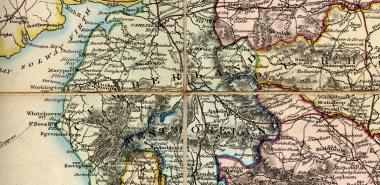
https://commons.wikimedia.org/w/index.php?curid=18432531
Eliza Lynn Linton, a prolific Victorian writer, was born in Crosthwaite Vicarage, Keswick, Cumberland in 1822. Her father, the Reverend James Lynn, was vicar of Crosthwaite, while her mother, Charlotte Alicia Lynn, was the daughter of the bishop of Carlisle. Sadly, Eliza’s mother died when Eliza was only five months old, and Reverend Lynn was left to superintend – or not – the upbringing of twelve children.
Eliza experienced a difficult time growing up at home, in the hurly burly of all her siblings; she was given no formal education, and also had the occasional sharp difference of opinion with her father. She did, however, take great solace in the natural landscape. Close to home, she describes in The Autobiography of Christopher Kirkland, how familiar she was with “every dock and ragwort and plot of nettles and mayweed in that ragged bit of pasture-land, sloping down to the little brook where the minnows were” (pp. 33-4, Vol. 1). She also explains that people made their own entertainment in the countryside of the Lakes: “Boating in summer; skating in winter; riding; long mountain rambles and more distant excursions; picnics in the daytime and ‘tea-parties in the evening’ ” (p.116, Vol. 1).
At the age of twenty three, Eliza sought to forge a life away from home, and moved to London, near the British Museum, where she began the long effort of supporting herself as a writer. Although Eliza Lynn Linton is little read today, she became the first female journalist in England to be paid a fixed salary, and wrote a voluminous number of articles, novels, and non-fiction books. She continued to publish throughout her long life, dying in 1898.
Both Eliza Lynn Linton’s life and literary works are intriguing, from the point of view of LGBTQ+ associations. Eliza had complex views on men and women, but was occasionally described in masculine terms herself, and she chose to take on a male persona in her novel-autobiography, The Autobiography of Christoper Kirkland, 1885. As well as having an unhappy marriage with the engraver, William James Linton, she experienced different types of relationships and attractions during her life. These included, it seems, a strong attraction which Eliza felt to a female married neighbour, when she was a young woman in Crosthwaite. Amongst her many novels, Sowing the Wind, 1867, and The Rebel of the Family, 1880, contain female characters whose gender and sexuality raise LGBTQ+ reflections. I hope to draw out the queer aspects of Eliza Lynn Linton’s life and works in future posts.

These are very informative posts, Ealasaid. You make your subjects live again. I’ve marked your blog as a favourite. Neil (from LGBT Centre)
LikeLike
Thanks, Neil!
LikeLike
Pingback: The Autobiography of Christopher Kirkland | LGBT+ Language and Archives
Pingback: The Rebel of the Family | LGBT+ Language and Archives
Pingback: Eliza Lynn Linton and a newspaper note | LGBT+ Language and Archives